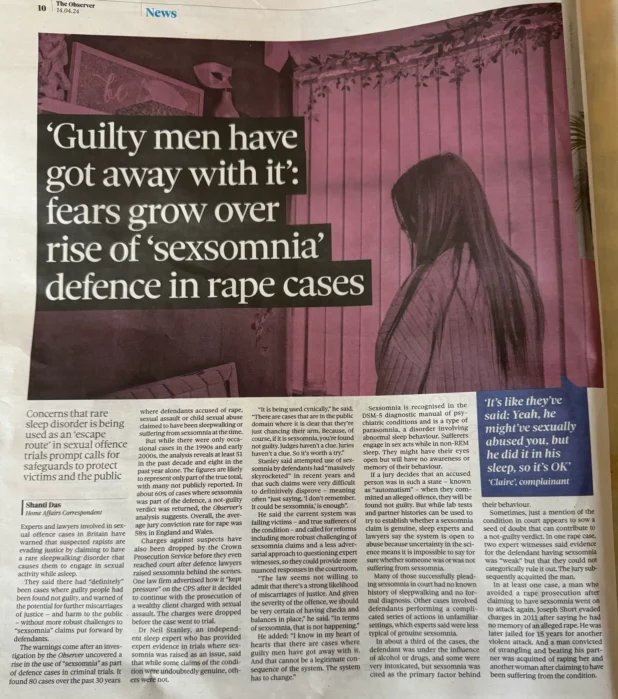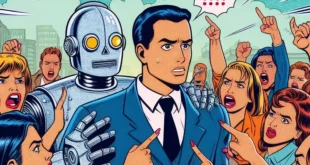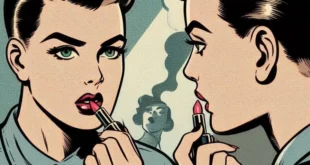I never even thought of using the excuse that I was sleepwalking to explain away rape. Usually, when women ask me why I raped them, I just say it’s because they were wearing revealing clothing and asking for it.
But this sleep-raping is a good angle.
Experts and lawyers involved in sexual offence cases in Britain have warned that suspected rapists are evading justice by claiming to have a rare sleepwalking disorder that causes them to engage in sexual activity while asleep.
They said there had “definitely” been cases where guilty people had been found not guilty, and warned of the potential for further miscarriages of justice – and harm to the public – without more robust challenges to “sexsomnia” claims put forward by defendants.
The warnings come after an investigation by the Observer uncovered a rise in the use of “sexsomnia” as part of defence cases in criminal trials. It found 80 cases over the past 30 years where defendants accused of rape, sexual assault or child sexual abuse claimed to have been sleepwalking or suffering from sexsomnia at the time.
But while there were only occasional cases in the 1990s and early 2000s, the analysis reveals at least 51 in the past decade and eight in the past year alone. The figures are likely to represent only part of the true total, with many not publicly reported. In about 60% of cases where sexsomnia was part of the defence, a not-guilty verdict was returned, the Observer’s analysis suggests. Overall, the average jury conviction rate for rape was 58% in England and Wales.
Charges against suspects have also been dropped by the Crown Prosecution Service before they even reached court after defence lawyers raised sexsomnia behind the scenes. One law firm advertised how it “kept pressure” on the CPS after it decided to continue with the prosecution of a wealthy client charged with sexual assault. The charges were dropped before the case went to trial.
Dr Neil Stanley, an independent sleep expert who has provided expert evidence in trials where sexsomnia was raised as an issue, said that while some claims of the condition were undoubtedly genuine, others were not.
“It is being used cynically,” he said. “There are cases that are in the public domain where it is clear that they’re just chancing their arm. Because, of course, if it is sexsomnia, you’re found not guilty. Judges haven’t a clue. Juries haven’t a clue. So it’s worth a try.”
Stanley said attempted use of sexsomnia by defendants had “massively skyrocketed” in recent years and that such claims were very difficult to definitively disprove – meaning often “just saying, ‘I don’t remember. It could be sexsomnia,’ is enough”.
…
Sexsomnia is recognised in the DSM-5 diagnostic manual of psychiatric conditions and is a type of parasomnia, a disorder involving abnormal sleep behaviour. Sufferers engage in sex acts while in non-REM sleep. They might have their eyes open but will have no awareness or memory of their behaviour.
If a jury decides that an accused person was in such a state – known as “automatism” – when they committed an alleged offence, they will be found not guilty. But while lab tests and partner histories can be used to try to establish whether a sexsomnia claim is genuine, sleep experts and lawyers say the system is open to abuse because uncertainty in the science means it is impossible to say for sure whether someone was or was not suffering from sexsomnia.
Many of those successfully pleading sexsomnia in court had no known history of sleepwalking and no formal diagnosis. Other cases involved defendants performing a complicated series of actions in unfamiliar settings, which experts said were less typical of genuine sexsomnia.
In about a third of the cases, the defendant was under the influence of alcohol or drugs, and some were very intoxicated, but sexsomnia was cited as the primary factor behind their behaviour.
…
Sexsomnia has also been used by defence teams in an attempt to discredit victims. Jade McCrossen-Nethercott, 31, from Croydon, is taking legal action against the CPS after it dropped her rape case days before it was due to go to trial after expert witnesses said she had sexsomnia.
McCrossen-Nethercott said the conclusion was made by an expert instructed by the defence who had never met her, and was based on her answers to a 15-question survey. “It was plucked out of thin air,” she said.
I am going to bring Sexsomnia to America.
I am going to become a lawyer specializing in Sexsomnia as a defense against fake rape charges, as well as real rape charges.
This one weird trick could transform the future of rape.
Is sexsomnia even real? Sounds like a bad excuse for r*pé pic.twitter.com/sYRX1sfVTU
— Theodora Fletcher (@TheoFletcher01) April 14, 2024
 Daily Stormer The Most Censored Publication in History
Daily Stormer The Most Censored Publication in History



